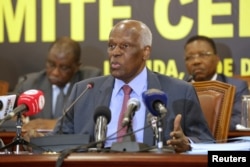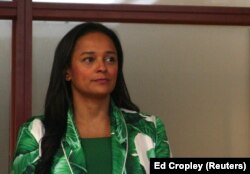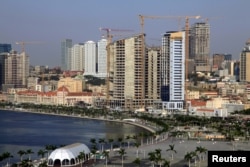Angola is preparing for a historic election that will see its longtime leader, President Jose Eduardo dos Santos, step down after 38 years in power; but, as the southern African nation prepares to vote, analysts inside and outside the country say they are keeping a close watch not on the ballot — but on the balance sheet of the state-run oil company, Sonangol.
The August election is a fairly straightforward two-way race between the long-time ruling party and established opposition. The winner will oversee a nation whose fortunes are heavily dependent on oil, which accounts for about 45 percent of the gross domestic product, and 95 percent of exports.
As dos Santos prepares for his exit, many wonder what will become of Sonangol, currently run by Africa’s richest woman — who happens to be the president’s daughter.
Isabel dos Santos and her family have weathered repeated allegations of rampant corruption.
“The most important thing here, in this transition, is how the economy is doing,” analyst Maja Bovcon of business consulting firm Verisk Maplecroft told VOA. “If the country is so dependent on oil, so it is also on Sonangol. If the prices for oil remain low for a long time, this actually will question the viability of the entire political-economic system, no matter who is actually in power.”
Glass half full or half empty?
How is the oil giant doing? The answer depends on whom you ask. Sonangol recently released a report documenting a $68 million net profit for 2016; but, analyst Alex Vines of research institution Chatham House — which credits Isabel dos Santos for stabilizing the company — says the reality may be harder to gauge.
“The reality is that there has been serious cost cutting, so there have been significant savings,” he said. “But the liquid assets, meaning the financial assets of Sonangol, have still significantly declined. They have declined 360 percent, from what I can see, in the figures, in 2015 to 2016.”
Investigative journalist Rafael Marques, a longtime critic of the government, says he’s documented numerous instances of the oil giant not paying its local debtors.
“It’s basically financial engineering that makes her present a positive net result,” he said of the latest Sonangol report.
Where Sonangol goes, so goes Angola
And that worries him, he says, because if Sonangol struggles, so does Angola.
Marques, who describes the state oil giant as “the heart of the regime,” says the fate of the company can make or break the next leader. That is a daunting task considering global oil prices have slumped in recent years.
“It will have to change, otherwise the president, the incoming president, will be booted,” he said. “Because this economy cannot be sustained for two more years in this current shape without breaking down the country ... And these sectors are controlled by the presidential family. So if there is no change, and there is no transparency, things will break down.”
Angolans go to the polls August 23.







